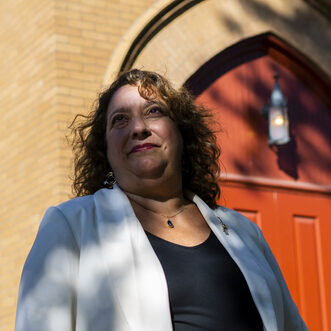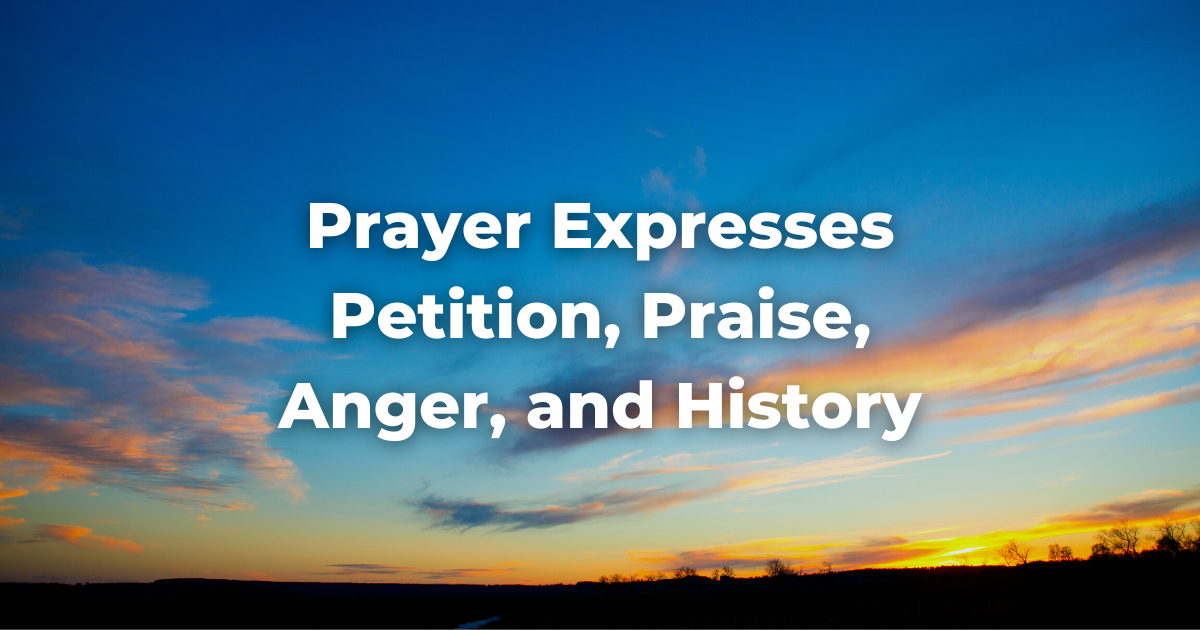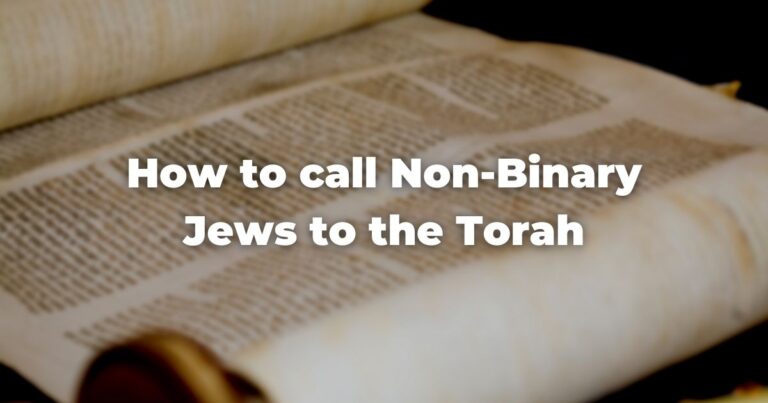Prayer is not just a recitation of words. But rather, prayer is an expression of a great many modes and experiences in Judaism.
Prayer as Petition and Praise
One of the ways that humans express need is through prayer.
In our formal prayers, we have many different opportunities to petition God for things wanting or lacking from our personal lives or the lives of our communities. (Even though we recite our prayers as individuals, the prayers themselves are communal, their texts ordained by tradition and presented in a common prayerbook all worshipers use.)
But prayer is not only petition.
It also serves as a vehicle to assist worshipers in coming to recognize God’s presence in their midst. In this sense, prayer is both the path to faith and a response to faith, both the spur to the great spiritual achievement of recognizing God’s presence in the world and also a response to it.
Through prayer, we come to believe in the cogency of faith, and, in turn, that belief helps us develop a humble appreciation of our place within creation.
When we stand in awe of God, we stand looking up to a powerful Being. There are, however, other times in our prayer lives during which we stand beside, not before, God, imbued with a sense of God as divine Friend and possessed of the conviction that God is not only governance and judgment, but also love.
Indeed, among the special gifts of communal prayer is the insight that comes to those who participate in it regularly that the power of our love for God is inextricably bound up with our sense of ourselves as members of the people of God.
This love, of course, is not unrequited, and the prayer service makes that point clearly, if subtly, to the worshiper every morning of the year: the blessing before the Sh’ma, the daily proclamation of divine unity, refers openly to God’s deep love for Israel, but the paragraph that follows refers just as clearly to Israel’s love for God.
This mutual relationship of love goes far beyond awe or praise to encompass the deepest aspects of our covenantal relationship with God: reciprocity, mutuality, and a commonality of commitment within the context of abiding love and the deepest sense of shared destiny.
Prayer as an Expression of Anger
There are times in our lives when we feel God has let us down. And there are times when we are uncertain about the degree to which we trust in God or believe in God’s essential beneficence.
These are not instances of blasphemous outrage, but important admissions of how things occasionally are. And, indeed, one important function of prayer is precisely to allow the worshiper to speak to God openly about feelings of anger, disbelief, fear, and potentially crippling doubt.
We can do this by “praying through” our own uncertainty, by continuing to recite familiar words precisely when the dissonance is so jarring as almost to be painful.
Indeed, this is one of the reasons that the TorahRefers to the first five books of the Hebrew Bible, the Tanakh, also called the Five Books of Moses, Pentateuch or the Hebrew equivalent, Humash. This is also called the Written Torah. The term may also refer to teachings that expound on Jewish tradition. Read more presents prayer, at least partially, as obligation and commandment: one need not feel absurd reciting the Hallel, the liturgy of praise and celebration recited on holidays, merely because one is feeling blue or unable to perceive the beneficent hand of God in one’s daily life at that particular moment.
We may never walk away from prayer, but we may change the rhythm, the accent, or the punctuation marks we use while praying. And, indeed, the experience of raising one’s voice slightly at the end of a requisite prayer as though nodding slightly to an unseen question mark—or pausing briefly to acknowledge an unprinted exclamation point—has its validity and meaning.
Of course, we can also recite those psalms that are formally expressions of anger, distress, and disappointment.
Praying is not numbly reciting other people’s poems, but engaging in an intense spiritual exercise designed precisely to carry us just as safely through the difficult times in our lives as through the joyous moments.
Prayer as an Expression of Historical Awareness
Jewish prayer is also the context in which Jewish individuals are best able to reflect on the religious nature of their community.
Indeed, the prayerbook, for all it is about the relationship of the worshiper and God, is also about the history of Israel. Worship is thus also an opportunity to step into the flowing stream of Jewish history and to take our places in the pageant of events stretching from hoariest antiquity to the present, and from the present into the distant future.
Thus prayer is also a kind of reenactment of history and a rededication to its lessons.
We recite the Song of the Sea from Exodus 15 during our early morning prayers, therefore, not out of some delusional fantasy that we are those people for whom the waters parted, but as a way of accepting our place in an ongoing sequence of historical events in which that instance of miraculous deliverance plays such a prominent role.
Similarly, when we begin our Amidah prayer by acknowledging God not solely as our personal Redeemer, but specifically also as the Redeemer of the greatest heroes of biblical antiquity, we affirm our belief in the concept of a shared history and destiny with those figures from ancient times.
Adapted with permission from The Observant Life.
Authors
-

The Observant Life: The Wisdom of Conservative Judaism for Contemporary Jews distills a century of thoughtful inquiry into the most profound of all Jewish questions: how to suffuse life with timeless values, how to remain loyal to the covenant that binds the Jewish people and the God of Israel, and how to embrace the law while retaining an abiding sense of fidelity to one’s own moral path in life. Written in a multiplicity of voices inspired by a common vision, the authors of The Observant Life explain what it means in the ultimate sense to live a Jewish life, and to live it honestly, morally, and purposefully. The work is a comprehensive guide to life in the 21st Century. Chapters on Jewish rituals including prayer, holiday, life cycle events and Jewish ethics such as citizenship, slander, taxes, wills, the courts, the work place and so much more.
View all posts -



Rabbi Dr. Karen G Reiss Medwed, works in higher education, as a Senior Assistant Dean for Faculty Affairs and Network Engagement. Dr. Reiss Medwed's scholarship includes understanding the growth of the field of digital education and instruction in higher education, K-12 education and faith-based education. Dr. Reiss Medwed was ordained by JTS in 1995, and earned her Ph.D. from New York University's Steinhardt School of Education in Curriculum, Teaching and Learning with a specialization in Jewish education in 2005. She was a Steinhardt Fellow for the four years of her doctoral studies. She went on to design and develop a Master of Education program in Faith-Based Education at the University of Pennsylvania's Graduate School of Education. Dr. Medwed has studied the development of innovative practices for digital learning and instruction and leadership in higher education.
View all posts






